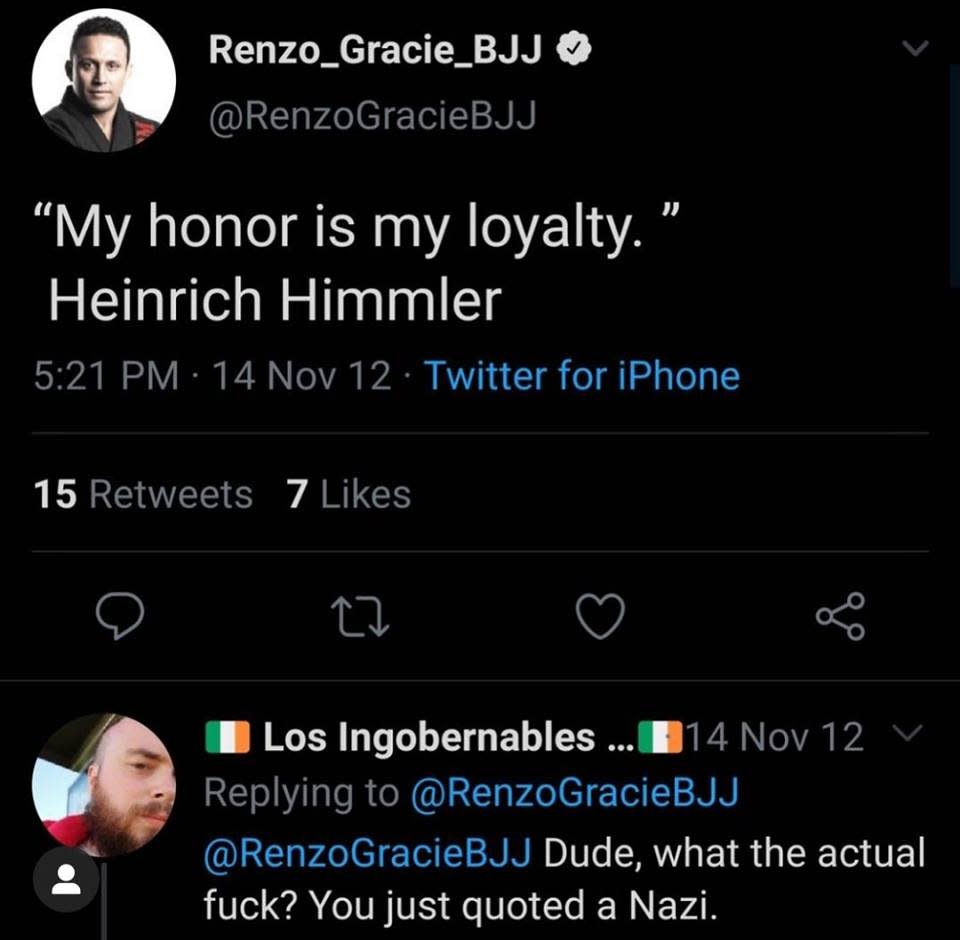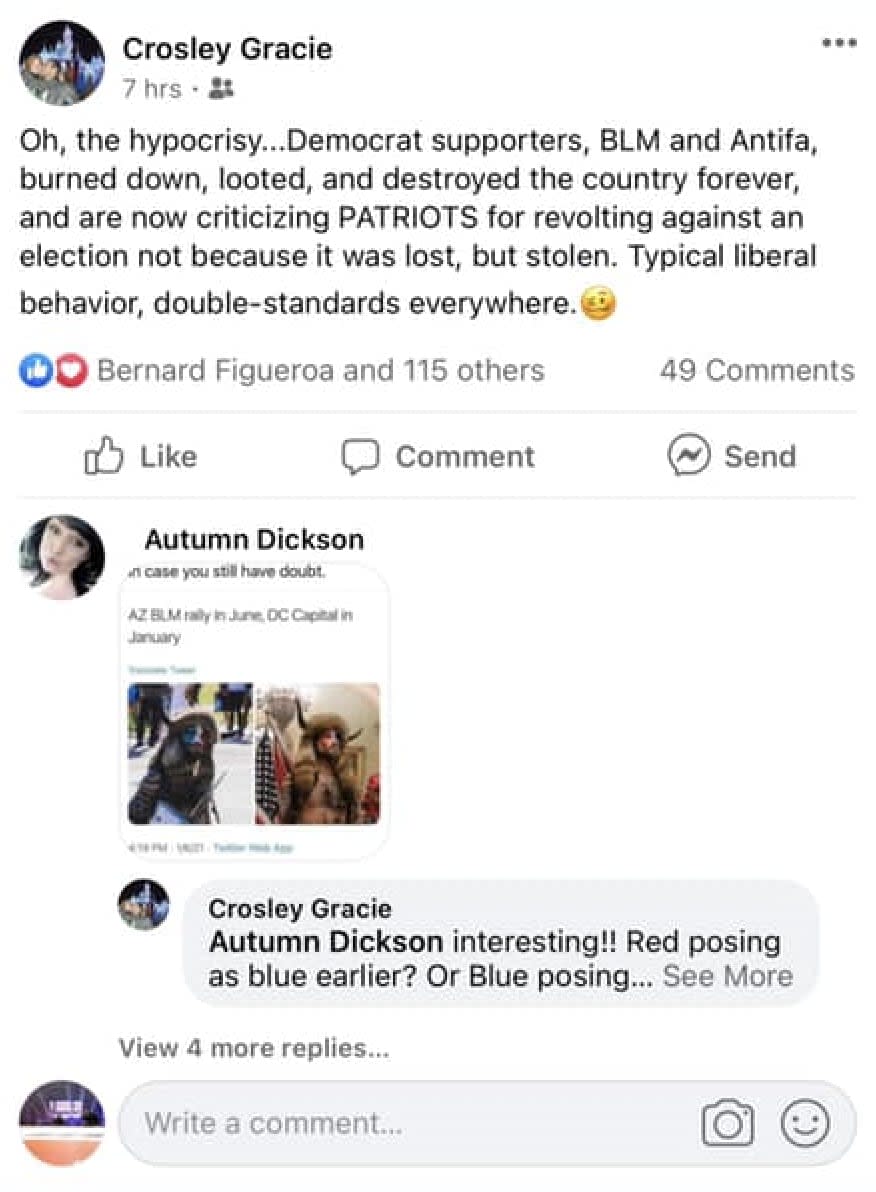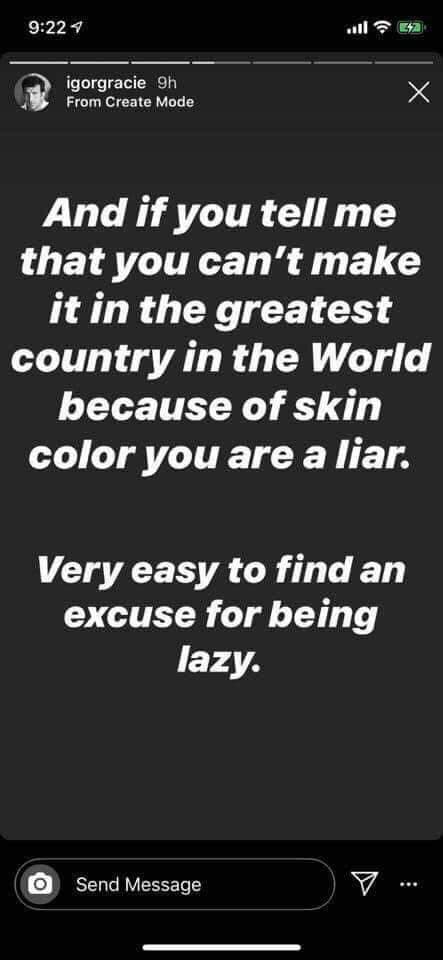He Trains Cops. His Jiu-Jitsu Family Has Deep Ties to the Far Right.

Rener Gracie, Brazilian jiu-jitsu expert and scion of a martial arts empire, has dismissed measures to legally rein in police chokeholds and proposals to defund departments driven by Black Lives Matter. In his opinion, cops need more martial arts training—an arena his family has been capitalizing on since the 1920s, when his grandfather Hélio Gracie and his granduncles pioneered Brazilian jiu-jitsu—and a wider budget to pay for it. Rener’s suggestions, however, belie the Gracie family’s history of racism and aligning with far-right movements.
In the waning months of 2020, Rener stood out among his family members because he did not directly quote Nazis or have the white supremacist-associated Blue Lives Matter symbol attached to his martial arts franchise. Moreover, his social media presence is devoid of references to the coup attempt in D.C. that left one police officer dead. He has, however, been offering police chiefs a strategy for responding to demands for downsized departments through his newly-updated Gracie Survival Tactics (GST) program. According to Rener, enrolling in his Brazilian jiu-jitsu classes will make cops feel more in control during arrests and less likely to lash out because of stress and frustration. If police finesse their approach to taking people down, he reasons, there would be fewer viral videos of cops using weapons, sparking public outcry.
Rener champions his grandfather’s legacy and martial arts prowess but has nothing to say about the late Hélio’s ties to fascism. Rener appears similarly loath to speak about how hateful politics have manifested among the younger generation of Gracies. Charles Fernandez, director of the GST program, said that Rener had no comment regarding his family’s affiliations with the far right. Rener and his company, Gracie University, do not get into “political debates.” But this has not stopped him from speaking his mind on the demands for police reform that have come alongside calls for racial justice.
Draymond Green Sounds Off on Trump and American Racism: ‘Time’s Up’
“All it takes is one use-of-force incident perceived as excessive force by the public to go viral in your city and you have riots… you have fires… sometimes the entire country feels the impact of a use-of-force disaster that happened on your watch,” Rener said in his Oct. 30 pitch to police chiefs. “We have to place value on the training… more effective than any other training or skill set, the regular training of jiu-jitsu.”
Originating in Japan, jiu-jitsu is a martial art that, similar to wrestling, focuses on grappling and immobilizing your opponents. The Gracies have been teaching it to a global network of clients for generations.
During his proposal, Rener talked money, arguing that his martial arts training would be crucial to restoring law enforcement’s reputation. In the narrative he laid out, scrutiny by anti-racist organizations and the general public leads to violence, rioting specifically, making it imperative for officers to get more GST hours under their belts so that they appear competent and are less susceptible to backlash. These are the promised dividends of police learning jiu-jitsu.
“It’s risk-mitigation. What if we can prevent the riot? What if we can prevent the viral video through better training?” Rener asserted in his pitch. “The money is there. Well, it may not be for long if defunding actually takes place, which is why it’s so important that you take action preemptively instead of waiting for someone to solve your departments’ problems for you.”
Rener’s tone is emphatic in videos like these. He looks directly into the camera, imploring chiefs to get their officers tactically certified by his franchise. He insists that jiu-jitsu can “save” the lives of officers and the people they are trying to restrain—while failing to acknowledge the history of institutional violence directed by police departments against Black communities cited by activists who have taken to the streets all across the country.
According to GST, officer violence is not driven by racism in the United States, where data shows Black people are most at risk of being killed by police, or the historical ties between modern policing and slavery. Rather, Gracie University contends that the roots of police brutality have to be viewed through a neuroscience framework. To them, police brutality is the result of officers becoming emotionally overwhelmed by high stress or threatening situations during arrests.
Rener swears by his and his family’s expertise. His branch of the family business has been training American police since the Rodney King beating, and has been adapting the tactical aspects of their curriculum based on officer feedback ever since. However, Gracie Survival Tactics does not include materials dedicated to racial bias. Fernandez summed up Gracie University’s position:
“We agree that police departments must address racial bias on a variety of fronts such as vigorous police recruit selection, background checks, racial sensitivity and cultural diversity training as well as professional standards oversight,” he said, explaining why Gracie University’s purview would remain tactical.
According to the Gracie University web page, 275 city law enforcement agencies, 106 state agencies, and 44 federal agencies participate in the GST program.
Rener and his curriculum may not have much to say about race, racism, and police reform but his family and their devotees have been quite vocal. Back in 2012, his cousin Renzo, who runs Renzo Gracie Academy in New York City, quoted Nazi leader Heinrich Himmler on Twitter. When he was called out, he defended the quote.

He continued his provocations in August, when he insinuated that 75-year-old Martin Gugino, who was knocked to the ground and bloodied by Buffalo police at a protest over George Floyd’s death, was faking it. He’s also shared memes of Jeffrey Epstein voting for Joe Biden; a post claiming that Biden would bomb Buenos Aires if Brazil doesn’t take good care of the Amazon; defended his right to say the N-word because he supposedly has a Black relative; and shared a false article insinuating that members of BLM and antifa were behind the Capitol riot. If that weren’t enough, the Renzo Gracie Academy franchise’s New Hampshire branch sports the thin blue line flag on a webpage promoting jiu-jitsu training for law enforcement.

Meanwhile, San Francisco-based Crosley Gracie, who operates a martial arts school in Brentwood, voiced his support for the Capitol building takeover.

Other members of the family have joined the far right’s online choir, too. “And if you tell me that you can’t make it in the greatest country in the world because of skin color you are a liar,” Igor Gracie, who operates a school in New Rochelle, New York, opined on Instagram. “Very easy to find an excuse for being lazy.”

Far-right politics also flourish among some of the Gracie’s acolytes. In addition to Daniel Gracie’s Facebook posts questioning the coronavirus and the U.S. election results, his academy in Philadelphia appears to have become a conduit for conspiracy-mongering about antifa’s supposed plans to destroy the neighborhood of Fishtown. As Black Lives Matter protests spread throughout the city following Floyd’s killing, so did unfounded rumors that anti-fascists planned to “break store windows and wreak havoc,” reported The New Yorker. This culminated in Justin Haskell, a mixed martial arts coach under Gracie, gathering students together to go fight the imagined threat.
Ultimately Haskell, along with a bunch of bat-waving and AR-15-toting compatriots, ended up menacing people protesting who had already borne the brunt of teargas and rubber bullets fired by the cops.
None of this seems out of character to Jose Tufy Cairus, a historian at Brazil’s Federal Institute of Santa Catarina, who has documented the cultural and political impact of the Gracies, especially as it pertains to nationalism. In 2012, he published the academic paper “The Gracie Clan and the Making of Brazilian jiu-jitsu.”
“In Brazil there [is] tons of evidence of the Gracies’ involvement in street thuggery through generations,” he explained.
Hélio Gracie was recently proven to have been a member of the Integralista (Fascist) Party in the 1930s. His brother Carlos was also likely involved in the movement. Tufy Cairus notes that the foreword of Carlos Gracie’s first book on jiu-jitsu, penned by a fascist bureaucrat named Henrique Pongetti, had very little to do with martial arts and instead devoted most of its attention to eugenics. The text lauded the Gracies’ martial arts achievements in incredibly racist terms, touting them as having defeated the “Japanese born in the cradle of this diabolical martial art.” He also celebrated the Gracies for triumphing over “half naked” practitioners of capoeira, a martial art rooted in Afro-Brazilian communities, and waxed poetic about Carlos’s strategic prowess, calling him an “ivory asp.”
Today, the Gracies are also close to the regime of far-right Brazilian President Jair Bolsonaro, who received an honorary black belt from Robson Gracie in 2018. Renzo currently serves as Tourism Ambassador for the authoritarian leader.
“I heard several accounts of similar behavior in the U.S. [which] in [no] way surprise[s] me or anyone else acquainted with the Gracies’ history,” said Tufy Cairus upon learning of the mob in Fishtown.
Rener’s positions are more understated. He frames himself as a problem-solver rather than a provocateur. The solutions he introduces, however, are predicated on a status quo of large policing budgets and the institution itself ultimately remaining beyond reproach.
His style involves treating police brutality with a lens that is technical, abstract, or even academic. In 2018, he gave a lecture to cops entitled “14-Year Old Girl Punched by Police-Excessive or Not?” complete with a white board and pointer. The video was nearly 26 minutes long.
Rener presents himself as the pragmatic martial arts instructor who eschews politics. He remained faithful to that aspect of his persona when he appeared on the podcast of right-wing gadfly Steven Crowder in 2015. Crowder even underscored this feature of Rener’s schtick, saying, “Rener Gracie’s not here to talk about politics”—while peppering their discussion about martial arts and self defense with jingoistic bravado and bluster.
After Rener left, Oath Keepers founder Stewart Rhodes came on. Casey Michel of The New Republic reported that this militia group, which participated in the storming of the U.S. Capitol, are “shock troops in the campaign to maintain the nation’s racial hierarchy, no matter how much bloodshed that goal requires.” But Rener does not talk politics.
Fast-forward to January of 2021. With one of his cousins supporting Stop the Steal and another falsely linking the Capitol riot with antifa, Rener maintains his silence. When pressed repeatedly for comment about his family’s far-right ties, Fernandez said, “The individuals you mention do not speak for us and are NOT affiliated with Gracie University. Gracie University does not engage in political debates.”
In other words: no comment.
Get our top stories in your inbox every day. Sign up now!
Daily Beast Membership: Beast Inside goes deeper on the stories that matter to you. Learn more.

 Yahoo Finance
Yahoo Finance 